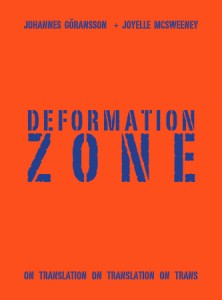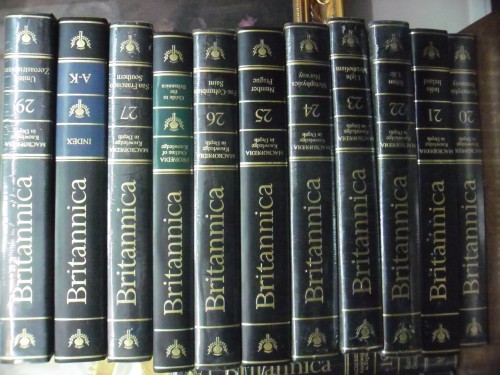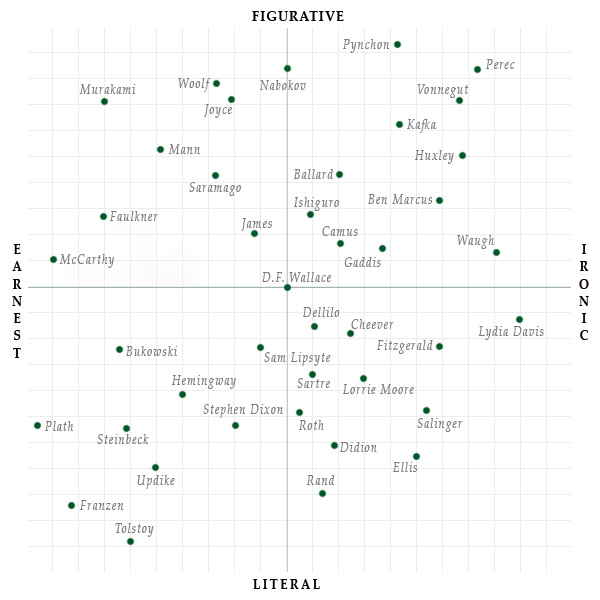Some Notes on Deformation Zone: On Translation, a Chapbook by Johannes Goransson and Joyelle McSweeney
 Deformation Zone: On Translation is the latest installment in Ugly Duckling Presse’s Dossier Series, which is edited by Anna Moschovakis, and which has already distinguished itself as one of the more adventuresome and aesthetically exciting projects in American publishing. (Other titles in the series include Christian Hawkey’s Ventrakl, Jon Cotner’s and Andy Fitch’s Ten Walks/Two Talks, and Laura Nash’s Brownfields.)
Deformation Zone: On Translation is the latest installment in Ugly Duckling Presse’s Dossier Series, which is edited by Anna Moschovakis, and which has already distinguished itself as one of the more adventuresome and aesthetically exciting projects in American publishing. (Other titles in the series include Christian Hawkey’s Ventrakl, Jon Cotner’s and Andy Fitch’s Ten Walks/Two Talks, and Laura Nash’s Brownfields.)
Deformation Zone might also be considered the latest installment in the intertwined multi-platform and multi-genre project that the careers of Joyelle McSweeney and Johannes Goransson have become. Both writers seem to have long ago eschewed any of the preexisting boxes into which literary artists typically confine themselves. Their work routinely crosses the borders that perhaps artificially have separated the practice of poetry, fiction, the personal essay, the scholarly essay, the Internet post, the stage play, the translation READ MORE >
FREE BOOKS SUNDAY
I am drowning in books. I want these books to be read. If you are interested in any of these titles, I will send them to you (one per person). If you write a review of the book, I will publish it on the PANK blog. Some of these have been lightly used but the pages aren’t sticky or anything. If you want a book, claim it in the comments AND e-mail me your mailing address (roxane at htmlgiant.com) and I will get it out to you sometime this week. Seriously, though, email me your address. I can’t track you down. Enjoy! (These books can only be shipped within the United States unless you want to pay for shipping. Sorry!)
ALL GONE. MORE SOON.
Cream of Kohlrabi by Floyd Skloot
Nothing Can Make Me Do This by David Huddle
The Postmortal by Drew Magary
Umberto Umberto Lamberto Lamberto Lamberto by Gianni Rodari
LA Is the Capital of Kansas by Richard Meltzer
Luminarium by Alex Shakar
A Discovery of Witches by Deborah Harkness
One of These Things Is Not Like the Other by Stephanie Johnson
Traffic With Macbeth by Larissa Szporluk
Mama’s Homesick Pie by Donia Bijan
The Best Of (What’s Left of Heaven) by Mairéad Byrne
She’d Waited Millennia by Lizzie Hutton
A Man of Glass & All The Ways We Have Failed by JA Tyler
The Hieroglyphics by Michael Stewart
The Nostalgia Echo by Mickey Hess
The Harbor by Ernest Poole
The Girl With the Crooked Nose by Ted Botha
Love and Shame and Love by Peter Orner
Running the Rift by Naomi Benaron
The Buenos Aires Quintet by Manuel Vazquez Montalban
Pocket Kings by Ted Heller
Dead Man Upright by Derek Raymond
The Coldest Night by Robert Olmstead
Until the Next Time by Kevin Fox
Dogma by Lars Iyer (2)
Radio Iris by Anne Marie Kinney
Red Weather by Pauls Toutonghi
Livability by Jon Raymond
Walking With the Comrades by Arundhati Roy
God’s Hotel by Victoria Sweet
Hurricane Story by Jennifer Shaw
The Watery Part of the World by Michael Parker
A Very Minor Prophet by James Bernard Frost
“…by writing we lose control…”
Consider this provocative statement from a recent post over at Montevidayo entitled “The Inhuman Art of Dying vs. Poetry’s Grief Police” by Lucas de Lima, “…by writing, we lose control of our narratives, and inevitably end up thwarting not just our intentions for a poem, but also the way we conceive of ourselves and our bodies as bounded, autonomous entities shaped through free will.”
…by writing, we lose control…
Like Brownian Motion: the presumably random drift of particles, which is, of course, among the simplest of the probabilistic processes, and thus serves as a limit of both simpler and more complicated stochastic processes, writing being one we might never have thought to correlate.

Which is to say, what may begin determined becomes random. A transformation. Or, perhaps, determination and control are always an illusion anyway…?
DARK MATTER #2
Dark Matter is a publication made up of poems and songs from other places on the internet.
14 laptops or hammers
2. Ander Monson wades into the whole D’Agata thingy.
2. Matt Mullins interview.
1. I Take Back the Sponge Cake is a choose-your-own-adventure collaboration between poet Sierra Nelson and visual artist Loren Erdrich.
1. Seems to me we flash fiction folks don’t really get enough book contests. Hell, here’s one.
14. Duck tape and eggs greeted vehicles traveling down Highway 3 in the early morning hours of Friday, March 16.
5. We learned about student evaluations from a sociologist. She said studies show men rate female professors lower than male professors on student evaluations, but men and women rate male professors the same. OK.
6. A little breakfast treat on tennis and DFW.
The woman is my own regret.
The children are my friends,
how they cannot reach, or save
me. The birds are my eyelashes,
the wolves are my hands.
Random Ass Live Reading of Some Recent Books I Liked #8
You missed the live reading. Excerpts were spoken from:
Partyknife by Dan Magers
The No Hellos Diet by Sam Pink
Meat Heart by Melissa Broder
Skin Horse by Olivia Cronk
A Beautiful Marsupial Afternoon by CAConrad
Crunk Juice by Steve Roggenbuck
Autoportrait by Edouard Leve
Fast Machine by Elizabeth Ellen
Percussion Grenade by Joyelle McSweeney
The Black Forest by Christopher DeWeese
Sister Stop Breathing by Chiara Barzini
Transfer Fat by Aase Berg
Two Points

1) On August 17, 1991, in CMT studios in Culver City, California, Kurt Cobain was, or at least affectedly, seen deep in the throes of executing a dissonant power chord. The video was lit as a Caravaggio painting, the dirty yellow umbers of indoor light shutting off the blue sky. A spotlight reflecting off the drum kit acts as fire, the incipient spark of a generation. The casting call summoned extras aged 18 – 25 years old dressed in “high-school persona i.e., preppy, punk, nerd, jock…,” the abbreviated, yet sadly accurate, ethos of our youth. The basketball hoop, perennial throughout the entire video, seemed both detached and stately as a crucifix. It represented the high school stadium, that place of mutual assembly, of cheerleaders and meanness, the constellation of gum hidden under bleachers. If the reader will bear with me, he and she will accept that everyone who entered CMT studios that day a little before 11:30 am was — besides one-or-two effectively null Asians (in our forthcoming yet apparent context) — white, which is less of a problem than a benign concession to the binary of race. It was simply time for white kids to freak out, and that’s okay. I’m glad I was there. 2) In 1994, following the controversial publication of The Bell Curve: Intelligence and Class Structure in American Life, which linked race to inherent qualities or even dispositions, a tenured anthropologist at U.C. Berkeley offered Michael Jordan as an example of a black person’s inherent talent, perhaps even genius, in physical ability — in this case jumping with inhuman ability — whose allusions to intellectual deficiency were sad yet subliminal. The book was quickly both dismissed and heralded by the suspecting parties. What concerns me here, though, is not race and a fractured America, of white and black boys and their respective thwarted fates proposed by dreams, but the delusional colorless hope shared by both: to see a pedestrian God so close yet so far from the net, frozen in the grace of their flourish, arms doing perfectly what needed to be done for their followers. The heavy wane of disappearing youth as a chord which drones for a long time afterwards, decades even. Two points stuffed by a weightless man, a marbled pose chiseled by spectacle, a stadium of held breath, high past a line from which others could only dare throw.
workshop 14
There is no secret to this at all. Use the CW vocabulary. The creative act is a feed triangle of writer and work and reader. Technical issues: beginnings, titles, structure, characters, language, setting, corn, mood, etc. Are we talking birds? Can you give me a map to that tunnel through the mountain so I don’t have to spend so much energy climbing this stupid mountain? Whether they’re absorbing it or not? No clue. Positive AND constructive comments. I’m getting a feeling you are a bigot. Comedians get to see if someone is actually laughing. Coaching and nurturing (editors don’t do this like in the past. Now groups and workshops and universities do this). WORKSHOPS are not debates! Makes art cooperative and collaborative. Were you ever lost? Did we understand the ending? Any transition problems? Is the horse believable? If I slap Barbie, how does she react? Dialogue realistic? Any places you felt tension? Don’t write the story where you kill the class, I beg you. A desire to see what happens? What is the central conflict? I love when characters say strange or funny things. The pilot said. “Hey, Tiger,” as a greeting to the little boy. After a brief pause, the kid said “I’m not a tiger.”
What is your mental image of the main character? THEME PLOT LANGUAGE Should you accept all of them, or ignore them, or what? It’s like Russian nesting dolls? Get inside the syntax. Maintain equilibrium so they can keep moving the work forward. Cleavage! Polite. Always respond to the story! Don’t ask her out with a comment. As a consequence I end up feeling at a loss when I don’t have a pen in my hand—it’s just a kind of job hazard that the pen is part of the reading life. Compare to things in class, other texts. Take notes as you read. A work is a work IN PROGRESS! You can accept or reject an opinion. If I say 2+2 does not equal 5, it won’t hurt your feelings. You will get last word in your FINAL DRAFT. I can’t move people in cars. Grammar concerns, editing, corn. Rudeness, sarcasm. Do NOT be prescriptive. It’s not your draft! A lack of honesty. “It was all good.” “This is not college level” etc. Remember, this is a draft. Is that beer? Confusing the writer with the material. (I can write from the perspective of Billie Holiday, for example.) I really can’t see that anything has changed. And the people in either of these extremes can vary greatly from room to room. You have to define the rules when using magic. The writing is too good to be written by a bad writer. Corn.
Goodbye to All That

When I was a kid, my mother assigned homework to my brothers and I in addition to any homework we may have been assigned in school. My mother’s homework was generally more of a priority. Some of her assignments came from Little Professor workbooks but most of her assignments came from the Encyclopedia Britannica, which she made us read, a lot. I have, in my lifetime, read the entire compendium. I know things.
My mother would give us a page range and we’d read and write little reports on what we learned. Other times we had to do assignments that reflected critical thinking—comparing and contrasting different topics, creating new entries or using existing entries as the starting point for a story or article of some kind. At times, I did not understand why we were being forced to read that stupid thing, but I know now—my mother wanted, in her way, for us to understand that knowledge is important, that knowledge is a tool for better thinking.




